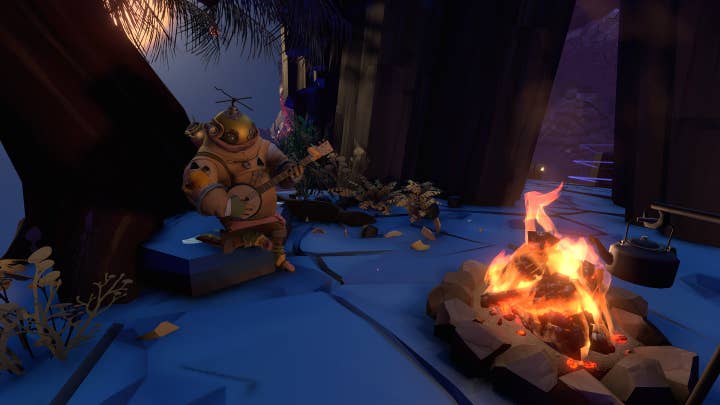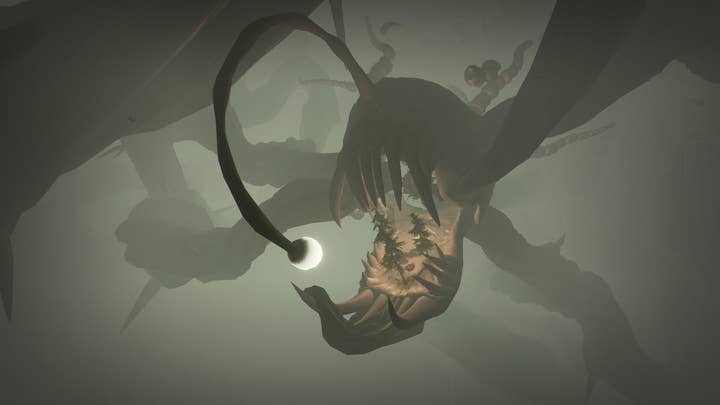Outer Wilds' existential loneliness is engaging, entertaining | Why I Love
Lovable Hat Cult's Patrick Jarnfelt explores Mobius Digital's curiously uplifting story of a doomed solar system
Why I Love is a series of guest editorials on GamesIndustry.biz intended to showcase the ways in which game developers appreciate each other's work. This entry was contributed by Patrick Jarnfelt of Lovable Hat Cult, which released Journey of the Broken Circle on Steam and Switch earlier this month.
A lot of games make you feel lonely, but few make you feel truly, cosmically alone the way Outer Wilds does.
It's not uncommon for a game to put you in the scenario of a sole survivor scrounging for supplies (as in Doom or Resident Evil), or puzzling how to escape a sci-fi/fantasy setting full of advanced alien machinery (as in Portal or Myst). But Outer Wilds' loneliness is different. It's lonely on an interdimensional scale that's completely and utterly overwhelming. What's more surprising is that it doesn't use its profound sense of solitude to dwell in melancholy, but rather finds a strange, zen-like peace with the randomness of the universe.
It doesn't start out a lonely game though. In its opening minutes, you're greeted by a wide array of plucky, purple alien creatures, excitedly congratulating you on acing your pilot's exam as you're about to embark on your first journey into the cosmos. Fun! It's only once you're out of your home planet's atmosphere that the loneliness sets in.
It becomes clear straight away that the universe is a cold and uncaring place. If you're anything like me, you'll forget to put on your spacesuit and suffocate immediately upon exiting your craft. Or maybe you'll carelessly set your ship's autopilot on a course that cruises through the sun. Or you'll get carried away playing with your jetpack on the low gravity moon and find yourself inadvertently leaping out of its atmosphere and aimlessly floating through space until you run out of oxygen. Whoops!
What's more than space being dangerous is the fact that Outer Wilds' worlds are always alive, always in motion. At any given moment each planet is both spinning around its axis and orbiting around the sun. Some planets are crumbling, others are ravaged by hurricanes that occasionally lift its islands into the heavens, and the brilliantly named "Hourglass Twins" function as a literal hourglass, passing sand between each other as they tumble around one another in perpetuity.
"There's no upgraded ship, or scanner, or jetpack. All you do is gain greater understanding about what's already happening"
These planets exist with or without you. Outer Wilds' miniature solar system doesn't feel like a series of video game levels waiting for the player to happen upon them and solve them, but rather it feels like a place that simply is.
This is enhanced by the fact that you, as the player, have little to no impact on the world. You don't gain better gear to maintain greater control over your environment. There's no upgraded ship, or scanner, or jetpack. All you do is gain greater understanding about what's already happening. All you gain is knowledge, which is an inherently internal possession.
Your impact in the universe is further diminished by the fact that Outer Wilds places you in a Groundhog Day-style time loop. Every 22 minutes, the sun explodes and you're put right back to where you were before embarking on your maiden voyage. Nothing you do matters in this world. Outer Wilds makes it clear that you're not just small in comparison to the cosmos; you're small in comparison to time. You can't forge any meaningful relationships when you exist in a time loop and no one else does. And your efforts are seemingly always in vain. What's the point of doing anything if none of it makes a difference?
This sounds like what should be a nihilistic, depressing game, and yet... it's not that at all! It's positively bursting with life! There aren't that many characters in Outer Wilds, but those you do encounter are largely upbeat and content. Most are some form of astronaut, bravely exploring the cosmos with a sprightly curiosity, yet they're equally content to chill around a campfire jamming on an instrument and roasting marshmallows. The point is clear: nothing we do in the end really matters, we're all going to die (in your case many times, over and over), but we might as well just enjoy the time that we have. Outer Wilds is maybe the most uplifting story about death I've ever experienced.

What's especially brilliant here is that Outer Wilds' themes and gameplay are so interwoven that there's no clear delineation of where one ends and another begins.
"The whole game is based around solving one gargantuan puzzle, and in order to process it you must pay close attention to everything you come across"
Lots of games have interesting stories, but you spend so much mental energy trying to solve their more traditional gameplay challenges that you're not actively thinking about the narrative (think trying to survive zombies and bandits in The Last of Us). Other games eschew challenges completely and only focus on narrative (like Gone Home), but I find it difficult not to tune out of these, since they can be completed without paying close attention.
In Outer Wilds, however, the narrative IS the gameplay. The whole game is based around solving one gargantuan puzzle, and in order to process it you must pay close attention to everything you come across. Every note, every piece of alien technology, every ecological phenomena you encounter is something that's both relevant to solving the game's ultimate challenge (i.e. "What should I be doing during this time loop?"), and fleshes out the history of these wild spinning worlds.
When I worked on my latest game, Journey of the Broken Circle, I thought a lot about how Outer Wilds makes players feel lonely and existential without being overly ponderous and self serious. While Journey of the Broken Circle is neither a time loop game or even much of a puzzle game, I sought to weave its themes of existential loneliness into the gameplay in a way that felt similarly cohesive. Whether or not I succeeded, I think Outer Wilds remains the gold standard for how game design can be used to evoke an introspective mood while remaining consistently engaging.
For a game about how little anything we do matters, Outer Wilds sure mattered a lot to me.
Developers interested in contributing their own Why I Love column are encouraged to reach out to us at news@gamesindustry.biz.









